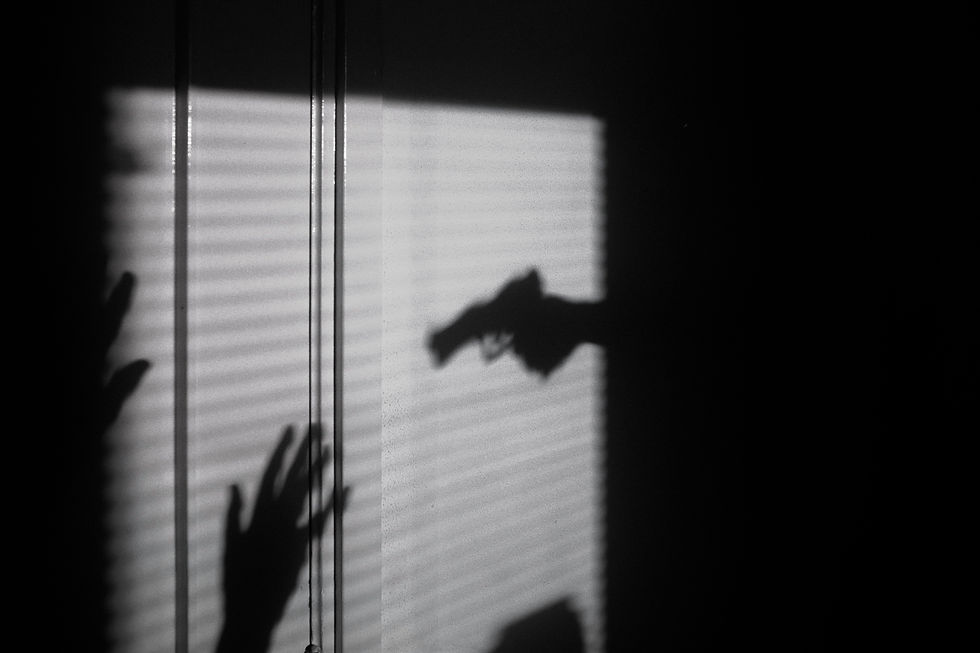Gun Violence against women
- Kevin Farrell
- Apr 9, 2025
- 2 min read
Updated: May 28, 2025
If every month, a 76 women died while talking on Hauwei cell phones don't you think Congress would take action and ban those cell phones before more women died? Yet every month in America, 76 WOMEN are SHOT and KILLED by an intimate partner. Surely, Congress must be doing something to stop these senseless murders, surely your Senator is fighting on the floor to end these killings. NO THEY ARE NOT. The only way we can end these senseless killings is by uniting in the fight, raising our fists against the gun lobby and demanding the rights of our daughters, nieces, mothers and friends to a life protected by intimate partner violence, which in the United States means GUN VIOLENCE. Abusers with firearms are five times more likely to kill their female victims,1 and guns further exacerbate the power and control dynamic commonly used by abusers to inflict emotional abuse and exert coercive control over their victims.
The statistics on the prevalence of intimate partner violence with a gun in the United States are staggering: Every month, an average of 76 women are shot and killed by an intimate partner.2 Nearly 6 million women reported having a gun used on them3 by an intimate partner.4 And beyond the daily toll of this problem, in at least 46 percent of mass shootings between 2015 and 2022, the perpetrator shot a current or former intimate partner or family member as part of the rampage.5 The ripple effects of firearms in the hands of an abuser extend far beyond the intimate relationship—affecting children who witness or live with it and the family members, coworkers, and law enforcement officers who respond to it.
While the deadly intersection of guns and intimate partner violence affects all women, it has a disproportionate impact on Black and American Indian / Alaska Native women as well as pregnant and postpartum women.6 In addition, segments of the LGBTQ+ community and people with disabilities are highly vulnerable to severe forms of relationship abuse,7 but there is alarmingly little data on the intersection of firearms and intimate partner violence among these populations because of underreporting of these incidents to authorities and failure to invest in research that disaggregates data to fully capture the extent of the problem.
While intimate partner violence involving guns presents a bleak problem, research shows that federal and state policies that disrupt abusers’ access to guns can save lives. One such recent example is the monumental 2022 Bipartisan Safer Communities Act (BSCA) that addresses various forms of gun violence, including disarming convicted domestic abusers irrespective of their marital status.8
State and federal lawmakers should enact the following policies and practices to ensure that abusers cannot access guns:
1. STRENGTHENING STATE LAWS prohibiting domestic abusers from possessing guns and requiring abusers to relinquish guns they already have.
2. IMPLEMENTING AND ENFORCING EXISTING LAWS on firearm relinquishment by state and local courts and law enforcement agencies.
3. STRENGTHENING THE FEDERAL BACKGROUND CHECK SYSTEM to keep guns out of dangerous hands by closing deadly loopholes and addressing deficiencies.
4. FUNDING COMPREHENSIVE RESEARCH on the nexus of guns and intimate partner violence.







I lost an eye and almost 2 yrs of my life because my LOVING husband lost his job and decided it was my fault. I wasn't aware of it at the time, but he had been arrested for beating his girlfriend a few years befor he met me. Why was he allowed to buy a gun?